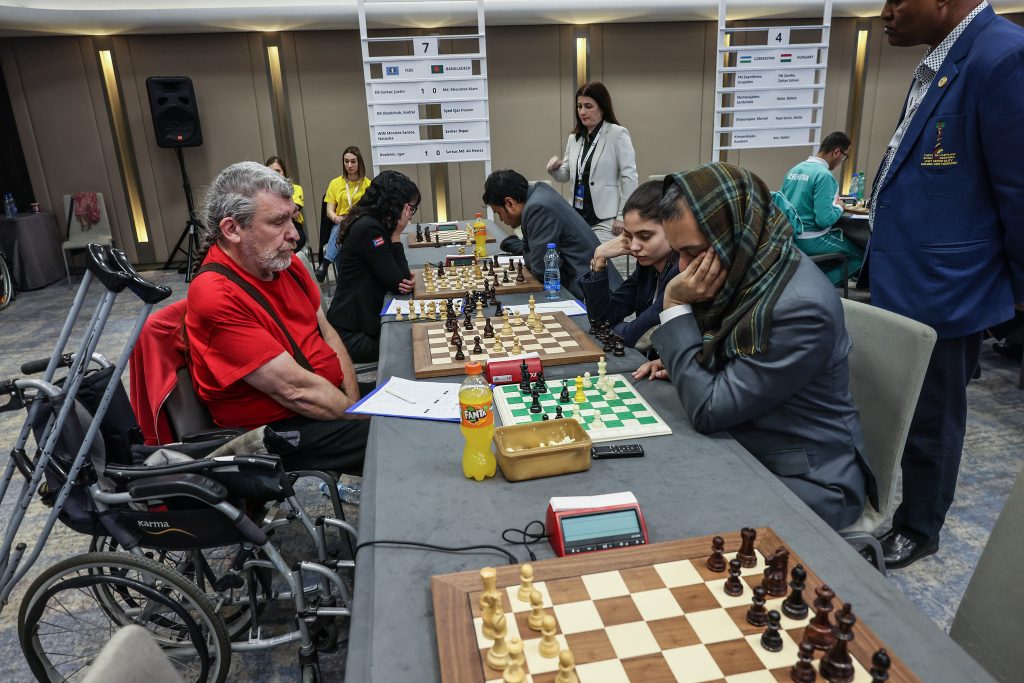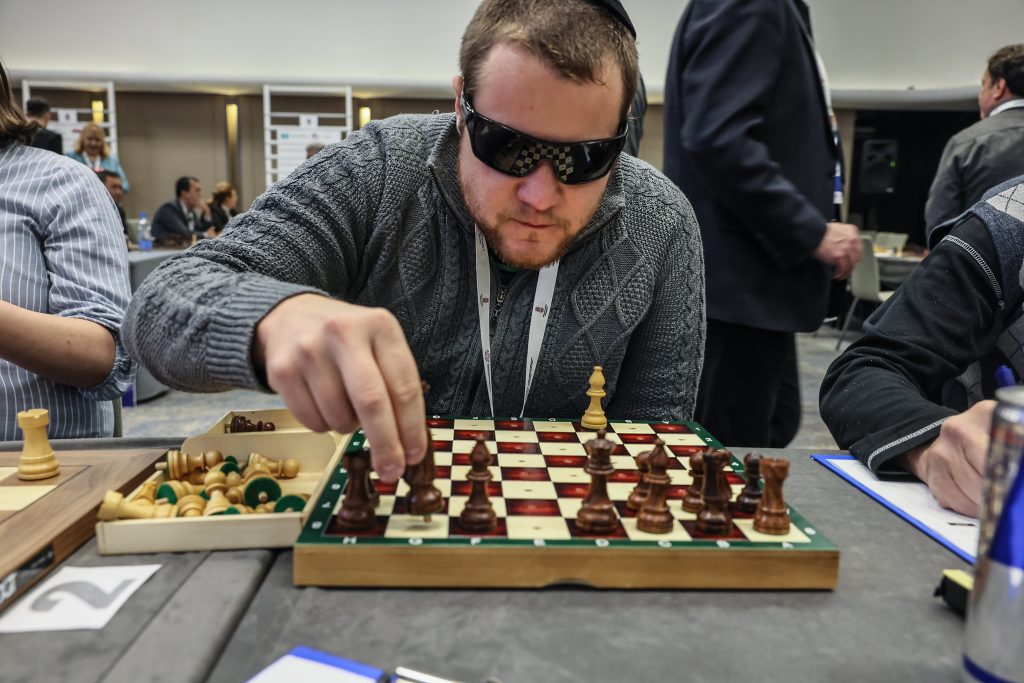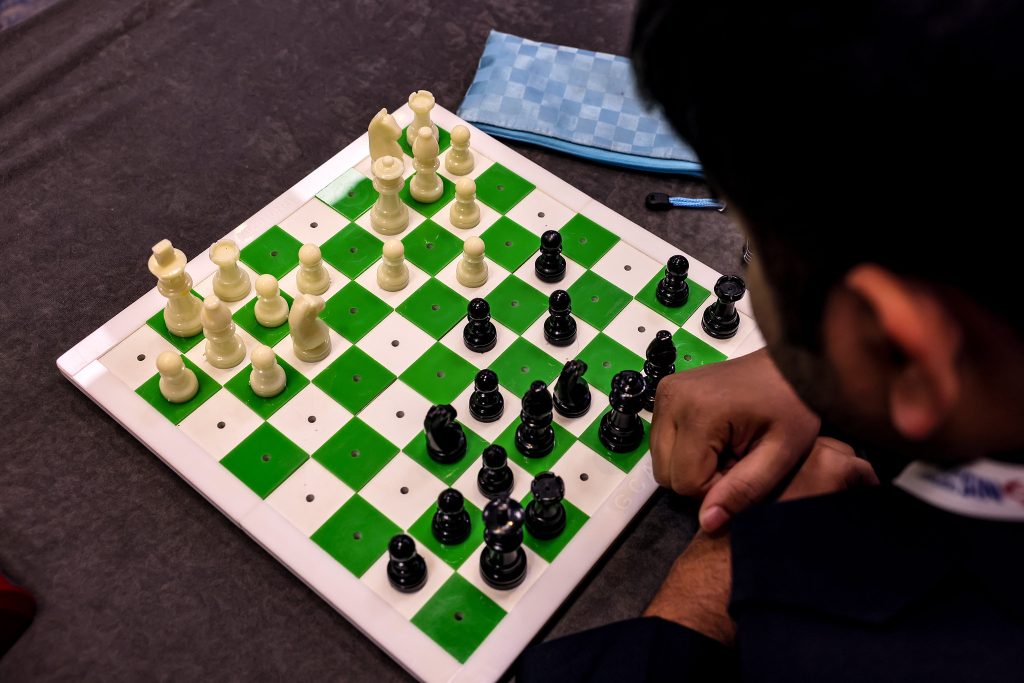It’s not just about people with disabilities being accepted by others. WE – people with disabilities – need to notice and accept other marginal categories in our society
By Marjan Kovacevic (DIS reporter)
Photo: Mark Livshitz
Already having separate international organisations and separate chess competitions for different categories of disabilities, do we need a joint event? What’s so particularly important about bringing together players with different kinds of disabilities?
If you were in Belgrade these days, you would agree that yes, we do need a joint event for chess players with various disabilities, for several reasons. There is a pragmatic reason for being much stronger and more numerous when united, both on the domestic and international stage. Governmental institutions are not enthusiastic when facing different demands by seemingly similar organisations, or seeing any kind of competition in presenting their needs and requests. Higher numbers rule everywhere, from social networks to mass protests and elections.

However, it is not only about our needs: to be noticed, accepted and appreciated. It’s even more needed that WE notice, accept and appreciate other kinds of marginalised categories in our society. The Belgrade gathering is such a precious opportunity for that.
How do we see ourselves? A persona with a disability usually doesn’t dwell too much on their circumstances. Some 99% of my adult life I spent without registering I’ve been any different from others. The remaining 1% was when I saw myself in a mirror or with a surprised look from a side.
It was harder in childhood, because of the surprised or even frightened looks of other people. Not because of objective obstacles – they are natural challenges a kid is proud to overcome. One of my strongest memories from early childhood was when I managed to button a series of very small buttons with two fingers only. What happiness and pride it was! Later on, each obstacle looked like an inviting challenge, creating a kind of competitive character in me.
The funny thing is that, while having one kind of disability, we still don’t understand much about other kinds. I’ve always been fascinated by the ways people with visual impairment overcome their obstacles: after playing chess with them, after seeing how they work or ski(!) on a high hill.
Some years ago, I watched a story about a sightless sportsman, a long-race runner. In the end, asked if he had any kind of request from society, he mentioned only one thing: the dog owners to take care of the marks their pats leave on the ground!
It was a shocking discovery for me! This was an inconvenience that would never come to my mind to mention.

During the Covid lockdowns and restrictions (and in Serbia, they were quite severe in the beginning), my good friend and a great chess composer, revealed a secret to me. The life under masks was killing his social life, simply because he needed to read from lips … Did anyone on a global level care about it in 2020-22?
There are hundreds of details that we don’t know about others, or we don’t care about. Brought together, in the 1st live Olympiad for people with different disabilities, we meet some of these differences and start learning about them. What looked impossible before now happens in front of our eyes.
The head of the FIDE commission on Disabled, GM Thomas Luther, likes to mention how many disabled people complain about their lives. Joining together, each of us may see people overcoming very different obstacles, some of them look much bigger than ours. This missing piece of empathy between different kinds of disabled people – instead of the vanity of each separate group – may be revived by the Belgrade kind of gathering.
And some new kids should fill the audience in the future, to see how miracles may come out of seemingly handicapped lives. Over the chess board, nobody sees what is called disability. Each member of chess society sees only the moves on the board and knows you according to them.

Marjan Kovacevic is a Serbian journalist. He edits the chess page of Politika daily and also covers tennis and Novak Djokovic. He is also a successful chess problemist (a Grandmaster of FIDE for both Solving and Composing), and the President of the World Federation for Chess Composition (WFCC).

General partner:
About NIS
NIS (Petroleum Industry of Serbia) is one of the largest vertically integrated energy companies in Southeast Europe. Its core business includes exploration, production and refining of crude oil and natural gas, sales and distribution of a wide range of petroleum products, as well as implementing projects related to petrochemical operations and power generation. One of the NIS’ strategic commitments and fundamental practices is continuous improvement of the living standard of communities of the company’s operation. NIS also attaches immense importance to setting an example and supporting development of professional and children’s sport.
